Draft decolonizing social studies presentation
Download as pptx, pdf0 likes350 views
The document summarizes a teaching story about integrating St'at'imc culture into K-12 schools in Lillooet, British Columbia. The teacher would take a 5-step approach: 1) incorporating St'at'imc stories, pictographs, technology into lessons; 2) ensuring the lessons are story-based, place-based, experiential, relational, and have high expectations; 3) building a team of administrators, First Nations support workers, elders, and community members; 4) defining roles and scheduling lessons; and 5) assessing students through existing rubrics and reflections. Essential supports would include administrative support, time, funding, existing community relationships, and commitments outlined in any Enhance
1 of 35
Download to read offline
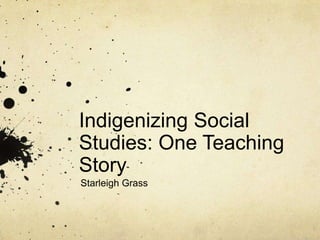
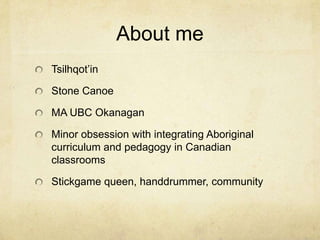
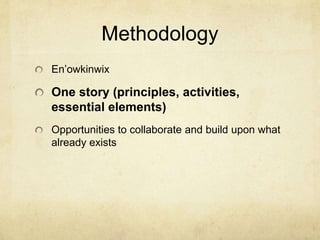
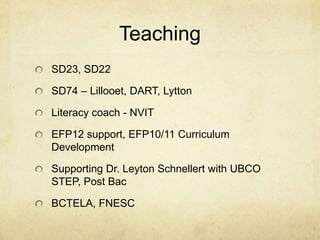
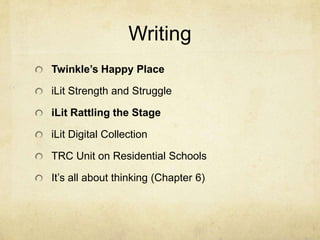
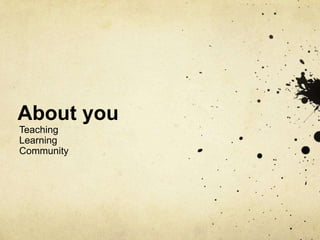
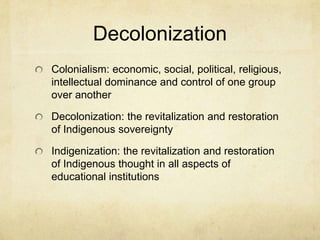
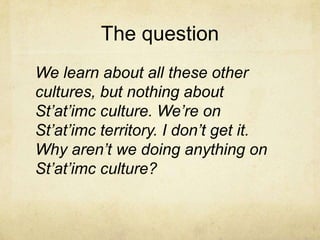
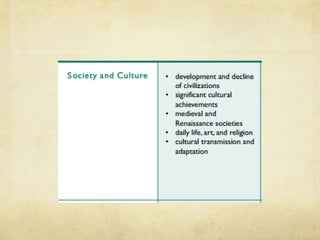
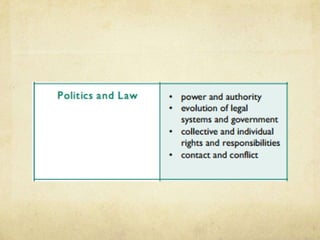
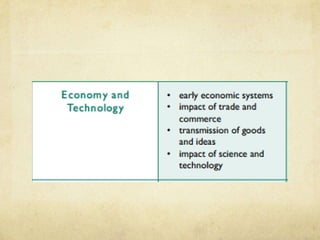
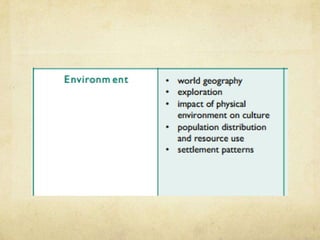


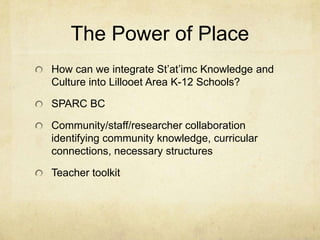

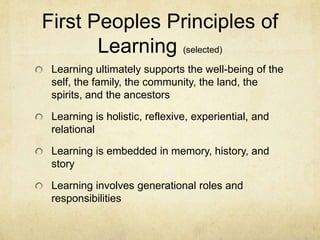

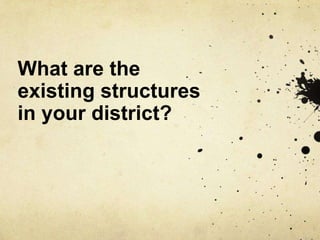
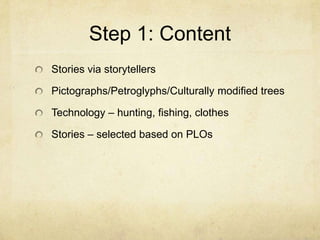
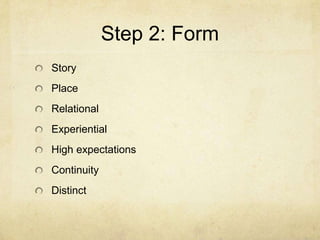
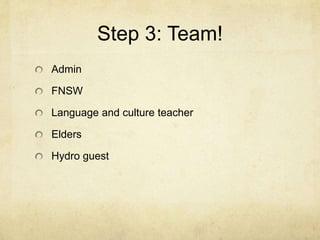
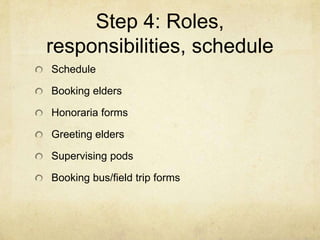
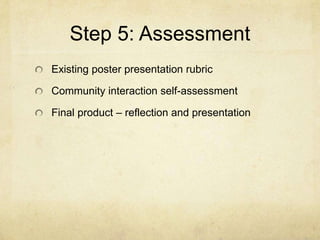
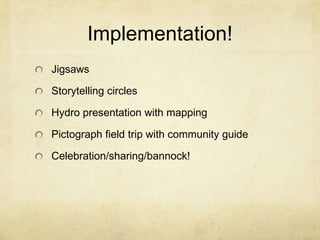


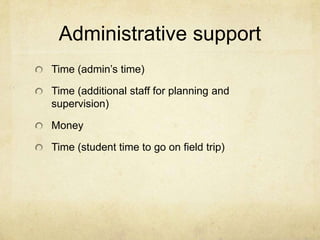
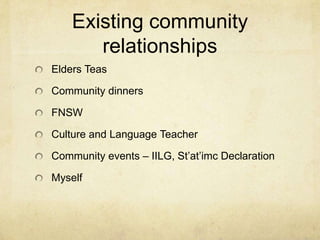
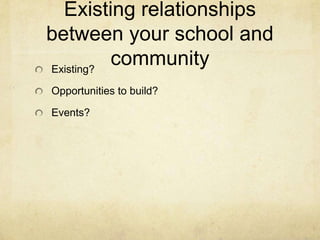
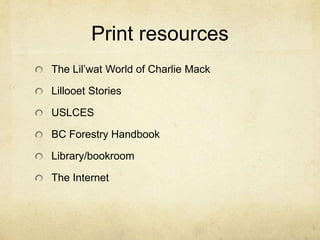
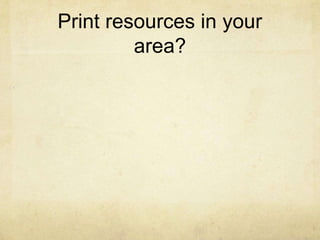
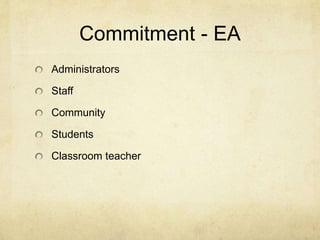


Ad
Recommended
Multiculturalism and the Culturally Diverse Classroom
Multiculturalism and the Culturally Diverse ClassroomShelly Sanchez Terrell
Ěý
This document provides strategies and resources for promoting multiculturalism, tolerance, and limiting bias in the classroom. It discusses culturally responsive teaching which recognizes students' cultural references in learning. Characteristics of culturally responsive teaching include having high expectations, knowing learners' cultures, student-centered approaches, facilitating parents partnerships, and making curriculum changes. The document then provides numerous specific activities, materials, websites and tools that teachers can use to explore students' cultures and identities, teach social justice, prevent bullying, and create a safe and inclusive environment for all students.Hispanic Heritage Month: Resources and Lesson Plans
Hispanic Heritage Month: Resources and Lesson PlansShelly Sanchez Terrell
Ěý
The document provides a comprehensive overview of Hispanic Heritage Month, observed from September 15 to October 15, highlighting its cultural significance and various resources for educators. It includes lessons, activities, and links to further materials to celebrate the contributions of Hispanic cultures in areas such as history, music, and art. The document also features online tools and platforms for virtual engagements, including guest speakers and collaborative classroom experiences.Trimarco_Jon_Abstract
Trimarco_Jon_AbstractJon Trimarco
Ěý
Formal education is threatening the transmission of traditional ecological knowledge among the indigenous Samburu people in Kenya. A study compared the ethnobotanical knowledge of students and non-students (moran) in the Waso Ward of Samburu County and found that moran had more knowledge. This is likely because they spend more time herding and have more opportunities for contextual learning. The study recommends that schools collaborate with local knowledge specialists to incorporate place-based learning and a focus on traditional ecological knowledge into their curriculum.Sneak Peak into the Happenings of a Private Elementary School in Brooklyn
Sneak Peak into the Happenings of a Private Elementary School in BrooklynWilliamsburg Northside Daycare School
Ěý
The document provides an overview of the functioning and inclusivity of private elementary schools in Brooklyn, highlighting the importance of a collaborative learning environment for students of diverse backgrounds. It emphasizes the integration of a fun and engaging curriculum that covers various subjects while promoting unity in diversity. The schools focus on instilling essential qualities of inclusiveness and cooperation through group activities and a well-rounded academic program.Sociocultural factors
Sociocultural factorsMitzy
Ěý
This document discusses several sociocultural factors that influence language acquisition, including culture, attitudes, social distance, and individualism vs. collectivism. It notes that culture consists of integrated patterns of ideas, customs, and behaviors that meet biological and psychological needs. Stereotypes form from our cultural environment, and having an open mind helps understand cultural differences. Attitudes develop in childhood from parents and peers and impact language success. Second culture acquisition involves stages like excitement, culture shock, and recovery. Social distance refers to differences between cultures, and parameters include dominance, integration, and value systems. The best language learning combines study of a second language and culture in the target language's environment.Cultural Influences on Context: The Educational Setting
Cultural Influences on Context: The Educational Settingamberl88
Ěý
This document discusses cultural influences on learning in educational settings. It covers how culture can impact learning styles, motivation, communication, and language. Some key cultural learning styles discussed include linear vs multi-active vs reactive, field independence vs sensitivity, cooperation vs competition, and tolerance for ambiguity. The document also addresses challenges of multicultural education and developing multicultural competency in the classroom. It provides strategies like show-and-tell and food days focused on different cultures.Culturally responsive teaching and academic success (4)
Culturally responsive teaching and academic success (4)UO_AcademicExtension
Ěý
The document discusses culturally responsive teaching and its role in academic success. It defines culturally responsive teaching as using symbols, language, art, and customs that demonstrate inclusion of all students. It identifies key factors that affect academic success, such as pre-school learning experiences, attendance, school climate, teaching quality, and student characteristics. The document recommends setting high expectations, managing implicit bias, and using explicit instruction coupled with active engagement to help students succeed. It also provides advice for teachers such as legitimizing student voices, building family partnerships, and adapting evidence-based practices for classroom cultures.HDFS 305 Guest Lecture
HDFS 305 Guest Lecture Rebecca Swartz
Ěý
The document discusses how culture shapes childhood experiences. It examines differences in child rearing goals, values and contexts across cultures. Cultural conditions refer to local beliefs and norms that give shape to a child's world. Caregiving relationships, age-graded activities, and views of the self vary substantially between individualistic and community-oriented societies. While Western views promote autonomy, other cultures emphasize community and spiritual obligations. Cultural influences are evident in communication styles and social behaviors by age 3. Attachment models also reflect culturally influenced parenting practices. The document prompts small group discussion of cross-cultural challenges faced by immigrant children.About UWC Australia
About UWC AustraliaUWC Australia
Ěý
The United World Colleges (UWC) aims to unite people across divides through education for peace and sustainability. UWC brings students from around the world together based on merit regardless of ability to pay. Students follow an International Baccalaureate curriculum while developing social, academic, philosophical and moral skills through a rigorous academic program, demanding social responsibility program, and intensive multicultural environment. The experience prepares students to empower themselves to make the world a better place.The Power of Community-Centered Education
The Power of Community-Centered EducationMichael Umphrey
Ěý
Community-centered education integrates local environments and community issues to enhance students' learning experiences, diverging from traditional educational frameworks. It fosters stronger community ties, improves academic performance, and promotes civic involvement by making education relevant to students' lives and local contexts. This approach addresses the disconnect between school and real-world application, encouraging students to engage meaningfully with their surroundings.Chapter 10 science for all
Chapter 10 science for allKristin Eaquinto
Ěý
1. The document discusses science education for all learners, emphasizing that science should be accessible to students regardless of their background.
2. It addresses science for students with disabilities, gifted students, and those from diverse linguistic and cultural backgrounds. Accommodations like IEPs and challenging enrichment activities are recommended.
3. The challenges of educating English language learners are also covered, emphasizing hands-on learning, concept development, and non-language cues. Teaching strategies should help students bridge past experiences and language gaps.W3 tesol507 cultural community outreach event presentation
W3 tesol507 cultural community outreach event presentationElizabeth Lee
Ěý
The document outlines a cultural community outreach event aimed at involving various stakeholders, including K-12 students, parents, and local businesses. Activities planned for the event encompass cultural celebrations, human rights discussions, and global issues presentations, with specific setups and entertainment options detailed for each area. Success will be measured through surveys and participation tracking to assess benefits such as cultural awareness and community pride.STEM to STEAM & Youth Media
STEM to STEAM & Youth MediaNettrice Gaskins, Ph.D.
Ěý
The document discusses STEAM education as an interdisciplinary approach that integrates academic concepts with arts and cultural practices, particularly focusing on culturally situated art related to African American, Native American, and Latin American cultures. It emphasizes the importance of connecting science, technology, engineering, and mathematics with personal interests and community contexts to make education more relevant. The author, Nettrice R. Gaskins, highlights the role of aesthetic choices in educational settings and how they can reflect cultural understanding.Geography
GeographyDr.Amol Ubale
Ěý
This document discusses the values of geography education, including educational values, ecological values, social values, physical development values, recreational values, and cultural values. It provides examples of how co-curricular activities can impart practical knowledge and firsthand experience to students. Excursions and tours can reinforce classroom learning in history and geography. Participation in debates and recitations can improve language skills. Drama can help teach history. It also discusses how values play an important role in integrating impulses and desires, building societies, influencing behavior, and guiding social norms.Wellington College - Examples of Service Learning
Wellington College - Examples of Service Learningdstruwig
Ěý
Pupils at Wellington College engage in various service learning projects that are connected to different academic subjects:
- In history class, pupils interview local veterans to record oral histories of their experiences with war and showcase these histories at the local library.
- An English assignment involves pupils researching issues facing local youth and writing persuasive essays to raise awareness, with the goal of publishing their findings for the community.
- A math project has pupils analyzing local demographic data to identify community needs and report their findings to officials.
- As part of language studies, pupils form pen pal relationships with students abroad, visiting the partner school to engage in cultural exchange and service.
- Art students partner with a youth program to plan andReview chapter 1
Review chapter 1Roseann Rinear
Ěý
This document provides an overview of key concepts relating to the ecology of child development and socialization. It defines ecology as the science of interrelationships between organisms and their environment. Socialization is described as the process by which individuals acquire knowledge, skills and traits to participate effectively in groups and society. The document examines how socialization is influenced by factors like family, community, culture and history, and how it is both an intentional and unintentional process. It also discusses theories relating to socialization and child development, such as Bronfenbrenner's bioecological model.Bitterroot draft 2 sd78
Bitterroot draft 2 sd78Starleigh Grass
Ěý
This document discusses decolonizing education through culturally responsive teaching. It argues that truly decolonizing education requires shifting away from solely preparing students for the job market and toward nurturing cultural revitalization. This means centering Indigenous knowledges and ways of knowing in the classroom in order to disrupt colonial epistemologies. The document advocates for making meaningful community connections, teaching local Indigenous histories, and focusing on self-determination and cultural continuity rather than just increasing test scores. It notes that cultural integration and community connections are linked to higher achievement, well-being, and self-determination for Indigenous students and communities.Indigenous pedagogy and learning oct2011
Indigenous pedagogy and learning oct2011ctluregina
Ěý
This document discusses Aboriginal perspectives on teaching and learning. It provides definitions of key terms and explores the ongoing impact of colonization. It describes Indigenous knowledge as experiential, rooted in language, and teaching responsibility. Indigenous pedagogy values independent learning through observation and encourages experiential learning through talking circles and storytelling. The document suggests strategies for teaching Aboriginal students, such as using a variety of teaching methods, including Aboriginal content, acknowledging systemic racism, and maintaining open communication.Cultural Geography
Cultural GeographyAvonnaSwartz
Ěý
Here are some key concepts about the growth of language shown through the development of the English language:
- Languages evolve and change over time as they come into contact with other languages and cultures through things like migration, trade, conquest, etc. Old English was transformed into Middle English by Norman French influences after the Norman conquest.
- Languages diffuse from their origin as their speakers migrate and settle new lands, spreading the language with them. English diffused from Britain to its colonies around the world.
- A language may take on new prestige and importance based on political, economic or cultural factors. As the British Empire grew, so did the global influence and spread of English.
- The core vocabulary and grammar of a language remains intactCulturally Relevant Teaching
Culturally Relevant TeachingJessicaTraylor
Ěý
This document discusses culturally relevant pedagogy and strategies for teaching culturally diverse students. It provides data about the demographic makeup and challenges facing students in Lamar County, Georgia. It then discusses the importance of understanding students' cultural backgrounds and incorporating their cultures and experiences into lesson planning to create a meaningful learning environment. Suggestions are provided for how teachers can make their instruction more culturally relevant, such as using popular music and media in lessons and having respect for students' home cultures.Assignment 2
Assignment 2Lorraine Stratkotter
Ěý
Lorraine Stratkotter, a University of Calgary student, proposes a pilot project to invite Niitsitapi or Blackfoot Confederacy Elders to share their oral traditions with the anthropology department. She had a meaningful experience learning directly from an Elder during an archaeology field trip. Many students and faculty have not interacted with the Blackfoot Confederacy or understood their deep traditions due to colonization. The proposal is to respectfully invite Elder(s) to host two interactive sharing sessions on different days and times, providing transportation, gifts, refreshments, and accommodations with funding. Attendees would fill out a questionnaire to help make the sessions permanent and extend this knowledge sharing. The goal is to promote understanding and healingCulturally Responsive Practices
Culturally Responsive PracticesCentro de Investigaciones Educativas
Ěý
This document discusses the importance of culturally responsive education. It notes that culturally responsive education ensures students' cultural references are included in all aspects of teaching and learning. The document then provides several examples of achievement gaps and disproportionality in the US education system, such as higher suspension rates for boys and African American girls in preschool, as well as less access to gifted programs and advanced courses for Black and Latino students. It emphasizes that teaching and learning involve social and cultural processes, and that language and culture should be built upon rather than dismissed. Effective teaching requires understanding students' cultural backgrounds and contexts.Teacher Education @ Global Perspectives
Teacher Education @ Global PerspectivesCenter for Global Education at Asia Society
Ěý
This document describes two strategies for developing global educators: 1) long-term school/university collaboration and 2) using cultural consultants. For the first strategy, a PDS Network creates collaboration between a university and schools to improve teacher training, provide professional development, and conduct research in social studies and global education. For the second strategy, educators from other countries are brought in as cultural consultants to share their perspectives and counter stereotypes. They provide insights to enhance intercultural understanding and global content within teacher education courses.Cleveland Catholic school wins national award for work with special needs chi...
Cleveland Catholic school wins national award for work with special needs chi...Pat Peters
Ěý
The Julie Billiart School in Lyndhurst, Ohio launched a summer camp called "Beyond Camp" to provide social skills training and combat summer learning loss for students with special learning needs. The camp served 30 students over four weeks, with activities including art, cooking, exercise, and field trips into the community. The goals of the camp were to develop social skills, generalize skills for career readiness, provide academic support, and deepen Catholic identity. Field trips gave students experiences in typical social activities and community places like pools, zoos, farms, and parks. This helped students gain confidence and experience the community in a supported way. The camp provided meaningful growth for students and an opportunity for the community to become more inclusive ofCulture and education
Culture and educationRicoReyes5
Ěý
The document explores the concept of culture, defining it as a complex whole encompassing knowledge, beliefs, and customs that are acquired by individuals in society. It outlines the various types and characteristics of culture, and emphasizes the significant role culture plays in shaping personal identity and adapting to social environments. Additionally, the impact of culture on educational institutions and vice versa is discussed, highlighting the need for cultural understanding in education.What is a Multicultural Curriculum
What is a Multicultural Curriculummaranaluca
Ěý
A multicultural curriculum aims to give equal attention to the contributions of all groups in society. It recognizes language diversity and validates all communicating systems. Its goals are to help students understand different cultures, function effectively across cultures, and prepare for global citizenship. Implementing a multicultural curriculum requires integrating diverse perspectives throughout the entire curriculum, using materials that represent various cultures, and having a diverse staff.Cultural proficiency
Cultural proficiencyanmsmith
Ěý
This document discusses the importance of cultural proficiency for leaders, organizations, and educators. It emphasizes that culture is everywhere and shapes values and behaviors. To be culturally proficient, leaders must recognize cultural norms and differences within and between groups. They must ensure the dignity of all people, address problems, and use knowledge to promote effective communication among diverse groups. Culturally proficient schools and educators acknowledge different learning styles, adapt to meet student needs, and engage parents as partners. The document provides guiding principles for building culturally proficient organizations.Powerpoint On Multiculturalism
Powerpoint On MulticulturalismNew York University
Ěý
The document discusses the importance of teaching social justice concepts in the classroom, including awareness, power, multicultural education, and curriculum. It argues that students need to understand their role in society and how their actions can create change. Both students and teachers must work to establish a learning environment where political and social issues can be discussed openly. A multicultural curriculum is necessary to raise awareness of injustices and engage students in social movements seeking to shift power towards marginalized groups.Humanities Presentation
Humanities Presentationjutecht
Ěý
The document provides an overview of the Humanities curriculum at SAS Pudong. It discusses integrating reading, writing, grammar and other subjects across core classes, specials and electives. The curriculum is theme-based and focuses on developing students' understanding of values, cultures, history and global issues. Integration allows for more authentic, connected learning to meet the needs of modern students.REPORTMAAMVALE.ppt this report is for ed
REPORTMAAMVALE.ppt this report is for edhananilantajo1
Ěý
The document discusses several social institutions including schools, families, education, religion, and government. It provides information on:
- The functions of schools including instruction, research, conservation, and social services.
- Types of education as formal, informal, and non-formal. Manifest and latent functions of education include socialization, social control, and transmitting culture.
- Characteristics and functions of families including child rearing and cultural transmission. Different family structures are discussed.
- Religion is defined as beliefs concerning life's meaning and purpose. Functions include social control, personality development, and providing explanation and comfort.
- Key social institutions and their roles in society are outlined.More Related Content
What's hot (20)
About UWC Australia
About UWC AustraliaUWC Australia
Ěý
The United World Colleges (UWC) aims to unite people across divides through education for peace and sustainability. UWC brings students from around the world together based on merit regardless of ability to pay. Students follow an International Baccalaureate curriculum while developing social, academic, philosophical and moral skills through a rigorous academic program, demanding social responsibility program, and intensive multicultural environment. The experience prepares students to empower themselves to make the world a better place.The Power of Community-Centered Education
The Power of Community-Centered EducationMichael Umphrey
Ěý
Community-centered education integrates local environments and community issues to enhance students' learning experiences, diverging from traditional educational frameworks. It fosters stronger community ties, improves academic performance, and promotes civic involvement by making education relevant to students' lives and local contexts. This approach addresses the disconnect between school and real-world application, encouraging students to engage meaningfully with their surroundings.Chapter 10 science for all
Chapter 10 science for allKristin Eaquinto
Ěý
1. The document discusses science education for all learners, emphasizing that science should be accessible to students regardless of their background.
2. It addresses science for students with disabilities, gifted students, and those from diverse linguistic and cultural backgrounds. Accommodations like IEPs and challenging enrichment activities are recommended.
3. The challenges of educating English language learners are also covered, emphasizing hands-on learning, concept development, and non-language cues. Teaching strategies should help students bridge past experiences and language gaps.W3 tesol507 cultural community outreach event presentation
W3 tesol507 cultural community outreach event presentationElizabeth Lee
Ěý
The document outlines a cultural community outreach event aimed at involving various stakeholders, including K-12 students, parents, and local businesses. Activities planned for the event encompass cultural celebrations, human rights discussions, and global issues presentations, with specific setups and entertainment options detailed for each area. Success will be measured through surveys and participation tracking to assess benefits such as cultural awareness and community pride.STEM to STEAM & Youth Media
STEM to STEAM & Youth MediaNettrice Gaskins, Ph.D.
Ěý
The document discusses STEAM education as an interdisciplinary approach that integrates academic concepts with arts and cultural practices, particularly focusing on culturally situated art related to African American, Native American, and Latin American cultures. It emphasizes the importance of connecting science, technology, engineering, and mathematics with personal interests and community contexts to make education more relevant. The author, Nettrice R. Gaskins, highlights the role of aesthetic choices in educational settings and how they can reflect cultural understanding.Geography
GeographyDr.Amol Ubale
Ěý
This document discusses the values of geography education, including educational values, ecological values, social values, physical development values, recreational values, and cultural values. It provides examples of how co-curricular activities can impart practical knowledge and firsthand experience to students. Excursions and tours can reinforce classroom learning in history and geography. Participation in debates and recitations can improve language skills. Drama can help teach history. It also discusses how values play an important role in integrating impulses and desires, building societies, influencing behavior, and guiding social norms.Wellington College - Examples of Service Learning
Wellington College - Examples of Service Learningdstruwig
Ěý
Pupils at Wellington College engage in various service learning projects that are connected to different academic subjects:
- In history class, pupils interview local veterans to record oral histories of their experiences with war and showcase these histories at the local library.
- An English assignment involves pupils researching issues facing local youth and writing persuasive essays to raise awareness, with the goal of publishing their findings for the community.
- A math project has pupils analyzing local demographic data to identify community needs and report their findings to officials.
- As part of language studies, pupils form pen pal relationships with students abroad, visiting the partner school to engage in cultural exchange and service.
- Art students partner with a youth program to plan andReview chapter 1
Review chapter 1Roseann Rinear
Ěý
This document provides an overview of key concepts relating to the ecology of child development and socialization. It defines ecology as the science of interrelationships between organisms and their environment. Socialization is described as the process by which individuals acquire knowledge, skills and traits to participate effectively in groups and society. The document examines how socialization is influenced by factors like family, community, culture and history, and how it is both an intentional and unintentional process. It also discusses theories relating to socialization and child development, such as Bronfenbrenner's bioecological model.Bitterroot draft 2 sd78
Bitterroot draft 2 sd78Starleigh Grass
Ěý
This document discusses decolonizing education through culturally responsive teaching. It argues that truly decolonizing education requires shifting away from solely preparing students for the job market and toward nurturing cultural revitalization. This means centering Indigenous knowledges and ways of knowing in the classroom in order to disrupt colonial epistemologies. The document advocates for making meaningful community connections, teaching local Indigenous histories, and focusing on self-determination and cultural continuity rather than just increasing test scores. It notes that cultural integration and community connections are linked to higher achievement, well-being, and self-determination for Indigenous students and communities.Indigenous pedagogy and learning oct2011
Indigenous pedagogy and learning oct2011ctluregina
Ěý
This document discusses Aboriginal perspectives on teaching and learning. It provides definitions of key terms and explores the ongoing impact of colonization. It describes Indigenous knowledge as experiential, rooted in language, and teaching responsibility. Indigenous pedagogy values independent learning through observation and encourages experiential learning through talking circles and storytelling. The document suggests strategies for teaching Aboriginal students, such as using a variety of teaching methods, including Aboriginal content, acknowledging systemic racism, and maintaining open communication.Cultural Geography
Cultural GeographyAvonnaSwartz
Ěý
Here are some key concepts about the growth of language shown through the development of the English language:
- Languages evolve and change over time as they come into contact with other languages and cultures through things like migration, trade, conquest, etc. Old English was transformed into Middle English by Norman French influences after the Norman conquest.
- Languages diffuse from their origin as their speakers migrate and settle new lands, spreading the language with them. English diffused from Britain to its colonies around the world.
- A language may take on new prestige and importance based on political, economic or cultural factors. As the British Empire grew, so did the global influence and spread of English.
- The core vocabulary and grammar of a language remains intactCulturally Relevant Teaching
Culturally Relevant TeachingJessicaTraylor
Ěý
This document discusses culturally relevant pedagogy and strategies for teaching culturally diverse students. It provides data about the demographic makeup and challenges facing students in Lamar County, Georgia. It then discusses the importance of understanding students' cultural backgrounds and incorporating their cultures and experiences into lesson planning to create a meaningful learning environment. Suggestions are provided for how teachers can make their instruction more culturally relevant, such as using popular music and media in lessons and having respect for students' home cultures.Assignment 2
Assignment 2Lorraine Stratkotter
Ěý
Lorraine Stratkotter, a University of Calgary student, proposes a pilot project to invite Niitsitapi or Blackfoot Confederacy Elders to share their oral traditions with the anthropology department. She had a meaningful experience learning directly from an Elder during an archaeology field trip. Many students and faculty have not interacted with the Blackfoot Confederacy or understood their deep traditions due to colonization. The proposal is to respectfully invite Elder(s) to host two interactive sharing sessions on different days and times, providing transportation, gifts, refreshments, and accommodations with funding. Attendees would fill out a questionnaire to help make the sessions permanent and extend this knowledge sharing. The goal is to promote understanding and healingCulturally Responsive Practices
Culturally Responsive PracticesCentro de Investigaciones Educativas
Ěý
This document discusses the importance of culturally responsive education. It notes that culturally responsive education ensures students' cultural references are included in all aspects of teaching and learning. The document then provides several examples of achievement gaps and disproportionality in the US education system, such as higher suspension rates for boys and African American girls in preschool, as well as less access to gifted programs and advanced courses for Black and Latino students. It emphasizes that teaching and learning involve social and cultural processes, and that language and culture should be built upon rather than dismissed. Effective teaching requires understanding students' cultural backgrounds and contexts.Teacher Education @ Global Perspectives
Teacher Education @ Global PerspectivesCenter for Global Education at Asia Society
Ěý
This document describes two strategies for developing global educators: 1) long-term school/university collaboration and 2) using cultural consultants. For the first strategy, a PDS Network creates collaboration between a university and schools to improve teacher training, provide professional development, and conduct research in social studies and global education. For the second strategy, educators from other countries are brought in as cultural consultants to share their perspectives and counter stereotypes. They provide insights to enhance intercultural understanding and global content within teacher education courses.Cleveland Catholic school wins national award for work with special needs chi...
Cleveland Catholic school wins national award for work with special needs chi...Pat Peters
Ěý
The Julie Billiart School in Lyndhurst, Ohio launched a summer camp called "Beyond Camp" to provide social skills training and combat summer learning loss for students with special learning needs. The camp served 30 students over four weeks, with activities including art, cooking, exercise, and field trips into the community. The goals of the camp were to develop social skills, generalize skills for career readiness, provide academic support, and deepen Catholic identity. Field trips gave students experiences in typical social activities and community places like pools, zoos, farms, and parks. This helped students gain confidence and experience the community in a supported way. The camp provided meaningful growth for students and an opportunity for the community to become more inclusive ofCulture and education
Culture and educationRicoReyes5
Ěý
The document explores the concept of culture, defining it as a complex whole encompassing knowledge, beliefs, and customs that are acquired by individuals in society. It outlines the various types and characteristics of culture, and emphasizes the significant role culture plays in shaping personal identity and adapting to social environments. Additionally, the impact of culture on educational institutions and vice versa is discussed, highlighting the need for cultural understanding in education.What is a Multicultural Curriculum
What is a Multicultural Curriculummaranaluca
Ěý
A multicultural curriculum aims to give equal attention to the contributions of all groups in society. It recognizes language diversity and validates all communicating systems. Its goals are to help students understand different cultures, function effectively across cultures, and prepare for global citizenship. Implementing a multicultural curriculum requires integrating diverse perspectives throughout the entire curriculum, using materials that represent various cultures, and having a diverse staff.Cultural proficiency
Cultural proficiencyanmsmith
Ěý
This document discusses the importance of cultural proficiency for leaders, organizations, and educators. It emphasizes that culture is everywhere and shapes values and behaviors. To be culturally proficient, leaders must recognize cultural norms and differences within and between groups. They must ensure the dignity of all people, address problems, and use knowledge to promote effective communication among diverse groups. Culturally proficient schools and educators acknowledge different learning styles, adapt to meet student needs, and engage parents as partners. The document provides guiding principles for building culturally proficient organizations.Powerpoint On Multiculturalism
Powerpoint On MulticulturalismNew York University
Ěý
The document discusses the importance of teaching social justice concepts in the classroom, including awareness, power, multicultural education, and curriculum. It argues that students need to understand their role in society and how their actions can create change. Both students and teachers must work to establish a learning environment where political and social issues can be discussed openly. A multicultural curriculum is necessary to raise awareness of injustices and engage students in social movements seeking to shift power towards marginalized groups.Similar to Draft decolonizing social studies presentation (20)
Humanities Presentation
Humanities Presentationjutecht
Ěý
The document provides an overview of the Humanities curriculum at SAS Pudong. It discusses integrating reading, writing, grammar and other subjects across core classes, specials and electives. The curriculum is theme-based and focuses on developing students' understanding of values, cultures, history and global issues. Integration allows for more authentic, connected learning to meet the needs of modern students.REPORTMAAMVALE.ppt this report is for ed
REPORTMAAMVALE.ppt this report is for edhananilantajo1
Ěý
The document discusses several social institutions including schools, families, education, religion, and government. It provides information on:
- The functions of schools including instruction, research, conservation, and social services.
- Types of education as formal, informal, and non-formal. Manifest and latent functions of education include socialization, social control, and transmitting culture.
- Characteristics and functions of families including child rearing and cultural transmission. Different family structures are discussed.
- Religion is defined as beliefs concerning life's meaning and purpose. Functions include social control, personality development, and providing explanation and comfort.
- Key social institutions and their roles in society are outlined.Poster presentationfinal
Poster presentationfinalAndy1518
Ěý
This document discusses implementing a service-learning project to address challenges in educating urban African American students. It provides background on service-learning and cites research showing its benefits, such as increased academic achievement and interest. The purpose is to compile evidence that service-learning can help address many issues in urban African American schools.Poster presentationfinal
Poster presentationfinalAndy1518
Ěý
The document discusses implementing a service-learning project in order to address challenges in educating urban African American students. It provides background on service-learning and how it has been shown to increase academic achievement and interest for these students. The purpose of the proposed project is to compile evidence that service-learning can help address many problems in urban African American schools and to share these results with educators.Anglin ppt poster slide
Anglin ppt poster slideAndy1518
Ěý
The document discusses implementing a service-learning project in order to address challenges in educating urban African American students. It provides background on service-learning and how it has been shown to increase academic achievement and interest for these students. The purpose of the proposed project is to compile evidence that service-learning can help address many problems in urban African American schools and to share these results with educators.Poster presentationfinal
Poster presentationfinalAndy1518
Ěý
The document discusses implementing a service-learning project in order to address challenges in educating urban African American students. It provides background on service-learning and how it has been shown to increase academic achievement and interest for these students. The purpose of the proposed project is to compile evidence that service-learning can help address many problems in urban African American schools and to share these results with educators.Poster presentationfinal
Poster presentationfinalAndy1518
Ěý
This document discusses implementing a service-learning project to address challenges in educating urban African American students. It provides background on service-learning and cites research showing its benefits, such as increased academic achievement and interest. The purpose is to compile evidence that service-learning can help address many issues in urban African American schools.Fn Pedagogy2008
Fn Pedagogy2008Sylvia Currie
Ěý
The document outlines a BCcampus-funded project aimed at enhancing online learning opportunities for Aboriginal learners through research, resource development, and community dialogue. It emphasizes the importance of First Nations pedagogy, which encompasses holistic education methodologies and culturally relevant practices rooted in traditional knowledge. Additionally, the workshop aims to identify effective instructional strategies and essential elements that support the success of Aboriginal students in online courses.Looking Back and Living Forward Indigenous Research Rising Up 1st Edition Jen...
Looking Back and Living Forward Indigenous Research Rising Up 1st Edition Jen...ayatoudecja
Ěý
Looking Back and Living Forward Indigenous Research Rising Up 1st Edition Jennifer Markides
Looking Back and Living Forward Indigenous Research Rising Up 1st Edition Jennifer Markides
Looking Back and Living Forward Indigenous Research Rising Up 1st Edition Jennifer MarkidesWeek 1
Week 1Glenna Gustafson
Ěý
This document provides an agenda and overview for an education course on social studies connections. It discusses expectations for the course, assignments including a current events assignment and work sample, and methods of instruction including microteaching and a learning exchange. It also prompts students to reflect on their prior experiences with social studies instruction and defines social studies and its goals. Finally, it lists assignments due by certain dates including reading assignments and tasks analyzing social studies standards and curriculum frameworks.Nation building through NEP 2020
Nation building through NEP 2020HardikKakkad1
Ěý
This document discusses the key principles and areas of focus of the National Education Policy 2020 in India. It outlines 21st century skills like creativity, critical thinking, and collaboration as aims of the policy. It discusses early childhood education, foundational literacy and numeracy, school education, teacher education, and adult education. The document provides details on curriculum, pedagogy, assessments, and functional changes to education institutions outlined in the policy.Social cosntruct of curriculum in elementary education of chhatishgarh,india
Social cosntruct of curriculum in elementary education of chhatishgarh,indiaDr Mahendra K Mishra
Ěý
This document discusses social construction of curriculum in Chhattisgarh, India. It argues that curriculum should be informed by local communities' knowledge and experiences rather than just textbooks. It notes that half the world's population is non-literate and their knowledge is equally valid. It questions whether schools adequately recognize diverse students' cultural backgrounds and languages. The document advocates constructing curriculum from communities' funds of knowledge to make education more inclusive, meaningful and democratic.Dragon Slayer Curriculum and sociological foundations of curriculum.pptx
Dragon Slayer Curriculum and sociological foundations of curriculum.pptxZuhoorElahi1
Ěý
The document discusses the sociological foundations of curriculum, emphasizing the importance of aligning education with societal needs, cultural values, and social changes. It introduces the concept of a 'dragon slayer curriculum,' which metaphorically prepares individuals to confront societal challenges like inequality and environmental crises. It highlights the risks of neglecting sociological considerations in curriculum design, leading to disconnection from reality, ineffective citizenship, and limited career prospects.PISMP TSLB3193 Topic 2b Applying Cultural Literacy Skills in Context and Tec...
PISMP TSLB3193 Topic 2b Applying Cultural Literacy Skills in Context and Tec...Yee Bee Choo
Ěý
The document discusses the concept of cultural literacy, emphasizing the importance of cross-cultural awareness, local culture awareness, critical reflection, and personal skills for becoming a change agent. It defines multiculturalism, cross-cultural, and intercultural communication, highlighting the differences between them and their significance in understanding diverse cultures. The text also outlines four levels of cultural awareness and suggests that integrating local knowledge and community involvement can enhance cultural literacy education.Merryfield TeacherPrep
Merryfield TeacherPrepCenter for Global Education at Asia Society
Ěý
The document discusses the challenges of preparing teachers with global perspectives. It outlines the key aspects of global education, including recognizing cultural assumptions, understanding multiple perspectives, and developing intercultural competence. It then describes the teacher education program at Ohio State University, which infuses global perspectives through interdisciplinary coursework, partnerships with diverse schools, online reflection with expert teachers, and performance-based assessments of teaching global content. The goal is to ensure teachers are well-versed in global issues and can reduce stereotypes by teaching with intercultural skills, worldmindedness, and open-mindedness.2012 34 info night
2012 34 info nighttim8hawk
Ěý
This document provides information for parents about Term 1 at Footscray Primary School. It introduces the 3/4 teachers and bilingual teacher and outlines general information like fruit breaks, sunsmart policy, and attendance. It describes the PYP Learner Profile attributes that students are encouraged to develop. It also summarizes the units of inquiry that students will study in 3/4 and provides details about parent involvement, specialist programs, camps, helpers, homework, and Mathletics.Aboriginal Learning
Aboriginal LearningChris Kennedy
Ěý
The document discusses Aboriginal learning in West Vancouver Schools. It provides an overview of how Aboriginal learning is embedded throughout the K-12 curriculum rather than taught in isolation. It highlights initiatives taken to integrate Aboriginal teachings, values, language, culture and history. This includes staff training, new resources on residential schools, focusing on local First Nations in the science curriculum, and creating a scope and sequence for Aboriginal learning across subjects and grades. It also discusses the pedagogical shift towards student-centered inquiry learning and an attitudinal shift to present Aboriginal knowledge authentically rather than as separate from the dominant culture. References are provided for further information on the district's Aboriginal Education Enhancement Agreement and resources on truth and reconciliation and BC'sCreative Approaches of Teaching Science to Students from Socially and Economi...
Creative Approaches of Teaching Science to Students from Socially and Economi...munushah
Ěý
The document outlines creative approaches to teaching science to students from socio-economically disadvantaged groups (SEDGs), emphasizing barriers such as economic hardship, limited access to quality education, and social discrimination. It highlights innovative teaching methodologies, including culturally relevant and student-centered approaches, as well as the integration of project-based learning to enhance engagement and comprehension. The National Education Policy (NEP) 2020 aims to provide equitable education by addressing these barriers and supporting diverse learning needs.Exploring the pyp at gems world academy
Exploring the pyp at gems world academyDavid Gerber
Ěý
The document presents an overview of the Primary Years Programme (PYP) at GEMS World Academy, focusing on the inquiry-based learning approach and interdisciplinary teaching. It outlines the curriculum structure, including science, social studies, arts, and physical education, and highlights the importance of assessment in tracking student progress. The mission is to develop reflective, caring learners equipped with the skills to contribute positively to the world.Culturally Responsive Classroom Management March 18-20
Culturally Responsive Classroom Management March 18-20SanJoseBTSA
Ěý
This document summarizes a training on culturally responsive classroom management. It discusses how culture can influence classroom dynamics and provides strategies for creating an inclusive classroom environment. The training addresses 5 elements of culturally responsive classroom management: 1) recognizing one's own cultural biases, 2) learning about students' cultural backgrounds, 3) understanding broader social contexts, 4) using culturally appropriate management strategies, and 5) building a caring community. Specific techniques are provided under each element, such as personal reflection, learning about students through home visits or cultural sharing activities, examining how management policies impact different groups, and creating a welcoming environment through relationships and cultural representation. The goal is for teachers to better understand students from diverse cultures and build inclusive classrooms.Ad
Draft decolonizing social studies presentation
- 1. Indigenizing Social Studies: One Teaching Story Starleigh Grass
- 2. About me Tsilhqot’in Stone Canoe MA UBC Okanagan Minor obsession with integrating Aboriginal curriculum and pedagogy in Canadian classrooms Stickgame queen, handdrummer, community
- 3. Methodology En’owkinwix One story (principles, activities, essential elements) Opportunities to collaborate and build upon what already exists
- 4. Teaching SD23, SD22 SD74 – Lillooet, DART, Lytton Literacy coach - NVIT EFP12 support, EFP10/11 Curriculum Development Supporting Dr. Leyton Schnellert with UBCO STEP, Post Bac BCTELA, FNESC
- 5. Writing Twinkle’s Happy Place iLit Strength and Struggle iLit Rattling the Stage iLit Digital Collection TRC Unit on Residential Schools It’s all about thinking (Chapter 6)
- 7. Decolonization Colonialism: economic, social, political, religious, intellectual dominance and control of one group over another Decolonization: the revitalization and restoration of Indigenous sovereignty Indigenization: the revitalization and restoration of Indigenous thought in all aspects of educational institutions
- 8. The question We learn about all these other cultures, but nothing about St’at’imc culture. We’re on St’at’imc territory. I don’t get it. Why aren’t we doing anything on St’at’imc culture?
- 15. The Power of Place How can we integrate St’at’imc Knowledge and Culture into Lillooet Area K-12 Schools? SPARC BC Community/staff/researcher collaboration identifying community knowledge, curricular connections, necessary structures Teacher toolkit
- 16. Enhancement Agreement Elders Teas Celebrating our Success FNSW Money Data
- 17. First Peoples Principles of Learning (selected) Learning ultimately supports the well-being of the self, the family, the community, the land, the spirits, and the ancestors Learning is holistic, reflexive, experiential, and relational Learning is embedded in memory, history, and story Learning involves generational roles and responsibilities
- 19. What are the existing structures in your district?
- 20. Step 1: Content Stories via storytellers Pictographs/Petroglyphs/Culturally modified trees Technology – hunting, fishing, clothes Stories – selected based on PLOs
- 21. Step 2: Form Story Place Relational Experiential High expectations Continuity Distinct
- 22. Step 3: Team! Admin FNSW Language and culture teacher Elders Hydro guest
- 23. Step 4: Roles, responsibilities, schedule Schedule Booking elders Honoraria forms Greeting elders Supervising pods Booking bus/field trip forms
- 24. Step 5: Assessment Existing poster presentation rubric Community interaction self-assessment Final product – reflection and presentation
- 25. Implementation! Jigsaws Storytelling circles Hydro presentation with mapping Pictograph field trip with community guide Celebration/sharing/bannock!
- 26. How do you decide whether or not it went well?
- 28. Administrative support Time (admin’s time) Time (additional staff for planning and supervision) Money Time (student time to go on field trip)
- 29. Existing community relationships Elders Teas Community dinners FNSW Culture and Language Teacher Community events – IILG, St’at’imc Declaration Myself
- 30. Existing relationships between your school and Existing? community Opportunities to build? Events?
- 31. Print resources The Lil’wat World of Charlie Mack Lillooet Stories USLCES BC Forestry Handbook Library/bookroom The Internet
- 32. Print resources in your area?
- 34. IMAGINE!
- 35. Support?
